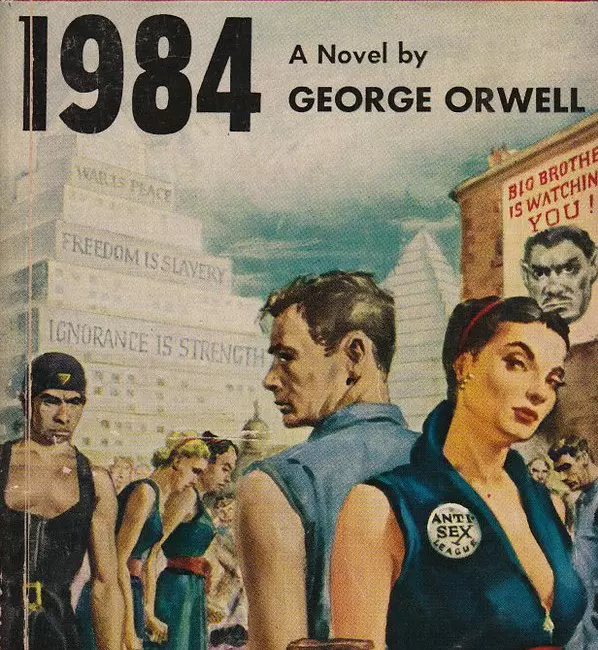George Orwell’s dystopian novel 1984 masterfully depicts a society dominated by a totalitarian government. Through extensive imagery, Orwell reveals the nature of an anti-utopian regime from the viewpoint of Winston Smith, an outer party member tasked with rewriting history, indicative of the past controls in the novel. His perspectives reflect the present controls in the novel and unveil the dystopian totalitarian society of Oceania, a nation in constant antagonism with others.

1984 by George Orwell is recognized as a must-read literary masterpiece, engaging readers across all age groups with its rich characters and stimulating essay topics. The novel’s detailed historicism and depiction of the dominant political party’s actions, echoing their party slogan, have inspired numerous thought-provoking essays.
While some may believe that all possible essay topics on 1984 have been explored, this is only partially true. Every essay uniquely explores an author’s thought process, offering new perspectives even on familiar themes. For instance, the concept of doublethink, central to Orwell’s political fiction narrative, continues to be a subject of lively debate. Moreover, the novel raises complex issues worth exploring, such as the effects of government surveillance and the erosion of civil liberties in a dystopian society.
How to Choose an Effective Topic

Consider the social problems highlighted in this dystopian literature to select a relevant essay topic. Possible research subjects include:
- Gender balance in the novel: Examine the roles of men and women, particularly focusing on Winston Smith and Julia’s relationship.
- Symbolism in the novel: Identify images and ideas that relate to real-world events and explore the author’s intentions behind these metaphors.
- Brainwashing: Analyze how altering history impacts the novel’s characters and how doublethink affects their behavior.
- Room 101 metaphor: Contemplate the symbolic significance of Room 101, where individuals confront their worst fears and psychological effects.
- Power display: Investigate how power is portrayed in the book and the Party’s methods to demonstrate its supremacy.
- Technology use: Discuss how technology is employed to limit freedom and its effects on characters’ mental and physical health.
- Historicism: Examine the correlation between events in the book and real-world history, comparing Orwell’s portrayal to historical periods like World War II or the Soviet Union.
These research ideas can become fascinating and purposeful essay topics. Consider each and choose a subject that offers fresh perspectives, ensuring to express your own opinions and attitudes.
How to Come Up With an Innovative Idea
Engaging your reader, sparking curiosity, and presenting fresh insights are the hallmarks of a compelling essay. But how does one achieve these? The answer lies in innovation. Innovation in essay writing is not just about uniqueness; it’s about offering a new understanding of a familiar subject. An innovative idea can challenge established viewpoints, connect disparate concepts, or revitalize well-trodden debates. Writing about a widely studied text like 1984 by George Orwell requires an innovative approach to stand out and encourage deeper discussion.
Understanding the Novel
To create innovative essay ideas, it is essential to understand “1984” thoroughly. Dive into the novel’s world, absorbing the plot’s nuances, character dynamics, themes, and Orwell’s distinct style. Reflect on the characters’ actions and the story’s development. Understand Orwell’s historical context and motivations, whether as a warning, critique, or dystopian vision. This deep comprehension will fuel unique essay topics.
Brainstorming Techniques
Enhance your brainstorming with techniques like mind mapping, starting with core concepts like ‘totalitarianism’ or ‘doublethink’ and expanding into related areas. Use free writing to unleash subconscious thoughts and insights. The questioning method can lead to innovative ideas by asking probing questions about the novel’s characters, themes, or Orwell’s intentions.
Connecting to Contemporary Themes
Consider how “1984” reflects our contemporary society. Draw parallels between Orwell’s dystopian world and current political and social issues. Analyze the novel’s portrayal of surveillance and propaganda in relation to modern discussions about privacy and misinformation. By linking these themes, you bring your essay a modern, innovative perspective.
Diving Deeper into Characters and Themes
Go beyond surface-level understanding. Explore the psychological depths of characters like Winston Smith, Julia, and Big Brother. Analyze how their motivations interact with Orwell’s overarching themes. Investigate themes like totalitarianism, privacy, and the nature of power. Such exploration will reveal fresh perspectives and groundbreaking essay topics.
Here is a comprehensive, comma-separated list of themes found in George Orwell’s “1984”:
Totalitarianism, censorship, manipulation of information, propaganda, surveillance, resistance to power, psychological manipulation, physical control, the alteration of reality, loss of individuality, loyalty, nationalism, sexuality and love, class struggle, language as mind control, memory and the past, fear, betrayal, fatalism, repression, truth, power, control, privacy, rebellion.
Examining Literary Devices
Study Orwell’s literary craft, focusing on how his use of metaphor, simile, irony, and foreshadowing enhances the narrative and themes. Understanding these devices is key to unlocking deeper meanings and forming the basis of insightful essays.
Here is an exhaustive, comma-separated list of literary devices found in George Orwell’s “1984”:
Allegory, allusion, analogy, antithesis, aphorism, apostrophe, assonance, cacophony, characterization, conflict, connotation, denotation, dialogue, dramatic irony, dystopia, euphemism, foreshadowing, hyperbole, imagery, irony, juxtaposition, metaphor, metonymy, mood, motif, paradox, parallelism, personification, plot, point of view, prose, repetition, satire, setting, simile, symbolism, syntax, theme, tone, understatement, foreshadowing, flashback, alliteration.
Encouraging Multiple Perspectives
View 1984, a classic in social science fiction, from different angles. Consider the story from the perspectives of various characters under the party’s control or through different theoretical lenses like feminist, Marxist, or postcolonial theories. These diverse viewpoints can illuminate the text and inspire unique essay topics.
Consult Secondary Sources
Expand your research with secondary sources like scholarly articles and literary critiques, seeing ‘1984’ as a prime example in its genre. They can provide new interpretations and context, enriching your essay with a well-rounded perspective. Critically evaluate these sources and integrate them to support your unique viewpoint.
Evaluating Ideas
Once you’ve generated various ideas, it’s time to evaluate them. Not all ideas are created equal. Ask yourself: Which of my ideas are truly innovative? Which ones offer fresh insights and perspectives on “1984”? Which will engage my audience most effectively? Consider the scope, depth, and relevance of each idea. Can you find enough evidence in the text to support your argument? Will your idea contribute to the existing discourse around the novel, or does it risk rehashing well-trodden arguments? This critical evaluation will ensure that you choose the most innovative and effective idea for your essay.
Comparative Analysis with Other Dystopian Novels
Explore the similarities between “1984” and other dystopian novels such as “Brave New World” and “Fahrenheit 451.” By examining these connections, you can uncover shared themes and storytelling methods in dystopian literature, offering a new perspective for your essay.
1984 Topic Examples

When choosing an essay topic for “1984”, it’s important to select a subject that resonates with you. Here are some topic ideas to consider:
- Mechanisms of Control: Explore how the Inner Party employs various methods to instill paranoia in Oceania’s citizens and analyze their effectiveness in maintaining the regime’s rule.
- Historical Parallels: Examine elements within “1984” that mirror real-world instances of totalitarian rule, such as the parallels between the Party’s tactics and those used in historical dictatorships.
- Winston’s Rebellion and Failure: Discuss the complex dynamics that lead to Winston’s inability to overthrow the oppressive government, focusing on the interplay between his character traits, the political environment, and societal structures.
- Effective Methods of Totalitarian Rule: Identify and argue the most effective strategy used by Big Brother to maintain control over society, comparing it with other methods depicted in the novel.
- The Role of Propaganda: Analyze the use of propaganda in the novel and its effectiveness in controlling the populace within a totalitarian society.
- The Power of Language: Delve into Orwell’s introduction of ‘Newspeak’ and discuss how language manipulation consolidates a totalitarian state.
- Technology and Control: Scrutinize how Orwell portrays technology as a tool for surveillance and societal manipulation in the novel.
- Dehumanization in Totalitarian Regimes: Discuss the dehumanizing effects of living under a totalitarian regime as portrayed in “1984”, focusing on how the regime’s control over individuality and personal life affects the characters.
- Doublethink as a Tool of Control: Examine how the concept of doublethink is used to maintain the totalitarian government, analyzing its role in perpetuating the state.
- The Role of the Proles: Analyze the depiction of ‘the proles’ in “1984” and discuss their potential as a disruptive force against the oppressive regime.
The Perils of Doublethink in 1984 (Essay Sample)
George Orwell’s “1984” provides a chilling exploration of a dystopian society under a totalitarian regime, where citizens are compelled to accept contradictory beliefs simultaneously – a concept Orwell termed as “doublethink.” This novel vividly portrays the sinister consequences of doublethink on personal freedom and objective reality. In this essay, we delve into Orwell’s critique of doublethink, elucidating its damaging impacts on individual freedom of thought and the recognition of objective reality.
In Orwell’s imagined world, doublethink serves as a psychological tool used by the totalitarian government to encourage citizens to accept the regime’s beliefs without question. A clear example of this is the contradictory phrase, “two and two equal five,” a statement that the people are compelled to accept, despite its obvious falsehood. This striking example of doublethink reveals the Party’s power to twist the truth and spread propaganda without facing any opposition. The widespread acceptance of such clear lies not only stifles independent thought but also creates a society where objective reality is constantly challenged.
The subtle danger of doublethink is that it pressures individuals to let go of their beliefs and follow the Party’s rules, stifling their freedom to think and act independently. This manipulation creates a society where people struggle to tell truth from lies, obediently accepting whatever messages the government puts out. Experts suggest that doublethink conditions people to view falsehoods as truths, highlighting the alarming level of control the Party has over the public.
Even more troubling, doublethink blurs the lines between what is real and what is not, creating a society where objective truth becomes meaningless. As Orwell pointed out, doublethink “negates the existence of objective reality while simultaneously accounting for the reality it denies.” In simpler terms, those who adopt doublethink willingly disregard objective truth, accepting any belief the Party presents, no matter how incorrect it may be. For instance, people might start to believe that eating fruits is harmful, even though they know fruits are healthy. This type of thinking helps authoritarian leaders maintain tighter control over the population.
Overall, Orwell’s “1984” paints a disturbing picture of a society crippled by doublethink, an instrument of manipulation stemming from totalitarian ideology. The consequences of this dangerous practice are the suppression of individual freedom of thought and the denial of objective reality, all serving to solidify the unyielding control of a corrupt government. Therefore, Orwell’s novel stands as a stark warning against the acceptance of doublethink, reinforcing the vital importance of independent thought and the recognition of objective reality in a democratic society.
References
- Anderson, M. (2016). Charter school reform: doublethink and the assault on the vulnerable. Journal of Thought, 50(3-4), 33-48.
- Kaye, S., & Chin, C. (2017). Donald Trump’s use of post-truth double-think politics is a threat to liberal democratic norms. USA pp–American Politics and Policy Blog.
- Moran, S. (2018). Control in WWII Novels: 1984 and Brave New World (Doctoral dissertation, Worcester Polytechnic Institute).
- Orwell, G. (1990). Nineteen Eighty-Four. 1949. The Complete Novels, 7.
Writing the Thesis Statement and Conclusion
Crafting the Thesis Statement
An impactful thesis statement is the linchpin of a compelling essay. It presents your central argument clearly and concisely and guides the structure of your essay. When writing a thesis statement for an essay on “1984”, ensure it communicates your unique perspective and directly addresses the essay question or topic.
Your thesis statement should present an argument instead of just stating a fact. For instance, instead of saying, “George Orwell’s ‘1984’ depicts a dystopian society,” you could argue, “In ‘1984’, George Orwell uses the depiction of a dystopian society to critique the abuse of political power and the loss of personal freedoms.”
Ensure your thesis is specific enough to be covered effectively in your essay and broad enough to allow you to discuss multiple aspects of the text. Your thesis statement should also indicate the key points you will use to support your argument.
For example: “In ‘1984’, George Orwell uses the motif of Big Brother, the concept of doublethink, and the character arc of Winston Smith to critique the totalitarian government’s manipulative control over individuals’ thoughts and actions.”
Finally, position your thesis statement at the end of your introduction. This placement effectively sets the stage for the rest of your essay and guides your readers on the journey of your argument.
Constructing the Conclusion
The conclusion is your final chance to make an impact on your readers, so make it count. It ties up your argument and gives your essay a sense of completion.
Begin your conclusion by rephrasing your thesis statement in a new way. Do not simply repeat your thesis verbatim—instead, revisit it in light of the arguments and evidence you’ve presented. This reinforces your central argument and demonstrates how your essay has supported it.
Next, summarize the key points you’ve made in your body paragraphs. This should not simply be a list but a synthesis of your main arguments demonstrating how they support your thesis.
Finally, consider the broader implications of your argument. What does your analysis of “1984” contribute to the understanding of the novel or the broader discussions around it? How does your essay connect to the world today? By ending your essay with a thought-provoking conclusion, you leave your readers with a lasting impression and demonstrate the relevance and impact of your arguments. For instance, you might conclude with a statement: “Orwell’s ‘1984’ serves as a chilling reminder of the power of propaganda and manipulation, urging contemporary societies to be vigilant against any infringement on individual liberties.”
Remember, your conclusion should not introduce any new arguments or information. Its goal is to wrap up your essay in a satisfying and coherent way, leaving your readers with a clear understanding of your argument and its significance.
Conclusion example
“George Orwell’s dystopian novel “1984” profoundly illustrates the grim outcomes of totalitarian rule, creating a cautionary tale of manipulated consciousness and obliterated freedoms. [Introduction of main theme] The exploration of language manipulation, the concept of doublethink, and the pervasive presence of Big Brother exemplify Orwell’s portrayal of the dangerous potential of absolute power to manipulate reality and alter citizens’ perceptions of truth and morality. [Key themes & concepts] The novel’s relevance in today’s digital age is undeniable, with increasing surveillance technology and the proliferation of ‘fake news’ raising urgent questions about privacy, truth, and the power of political manipulation. [Contemporary relevance] More than a mere work of fiction, ‘1984’ serves as a chilling prophecy and stark reminder of the importance of critical thinking, freedom of expression, and individual autonomy. As we delve deeper into an era marked by digital surveillance and data manipulation, Orwell’s ‘1984’ remains a necessary critique and potent warning, underscoring the need for constant vigilance and resistance against any threats to our freedoms. [Conclusion & broader implications]”

